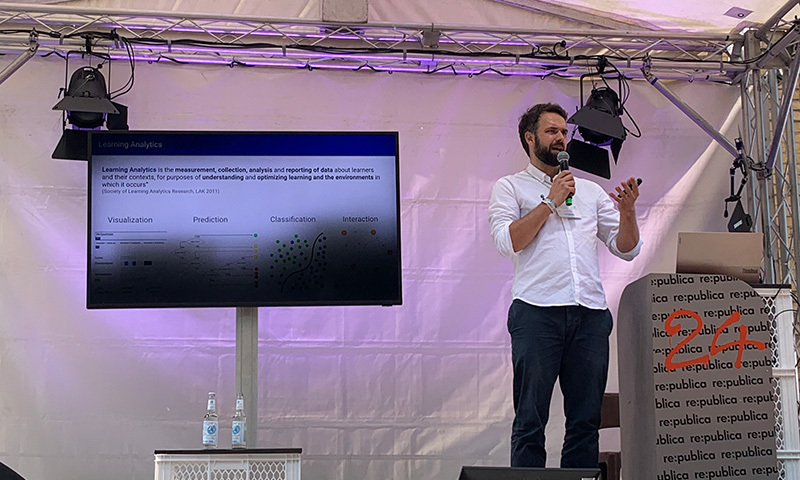News
Reversed Big Brother Principle for Learning Analytics
[17.06.2024]This was the title of Dr. Niels Seidel's presentation at re:publica 24. He is drawing attention to a field in the field of learning analytics that has received little attention to date. Up to now, teachers have seen data traces of their course participants, but students hardly see anything of how teachers perform their teaching tasks in an online course. What would this new approach mean in practice?
 Photo: Privat
Photo: Privat
For over ten years, learning analytics has been an established field of research that deals with the measurement, collection, analysis and monitoring of educational data and the interventions derived from it. The aim is to derive from student data how they can be better supported and guided, how courses can be better designed and how learning performance can be improved.
As part of his research at CATALPA, Niels Seidel is investigating how this student data can contribute to improving students' self-regulation, i.e. their motivation and independent organization and control of their own learning, in online teaching. Some time ago, however, he came across the "Reversed Big Brother Principle" in Estonia: in the Baltic state, citizens can see which authorities have accessed which of their data and when.
Transparency and trust
"I found the principle interesting. It creates transparency and trust. First of all, it allows students to understand which of the data collected about them is actually being used by teachers," explains the researcher. If you take the principle even further, it also relates to the visibility of teaching activities. Teachers would be supported by learning management systems in gaining an overview of the course and the learning activities taking place within it. However, students would remain largely unaware of what teachers are doing. "Compared to a face-to-face course, it's a bit like the teacher hiding behind the lectern while sporadically answering questions and secretly changing the text on their presentation slides. An online course ultimately creates a shared collaboration space for all participants, in which the teachers, as the most important group of people, are active in many places. We could strengthen the personal relationship through greater visibility and transparency of teaching activities. Students could thus realize that there is someone who cares about the course and their concerns."
Great agreement among teachers and learners
But what information would teachers disclose about themselves? And what information would students like to see? "Basically, it's important for me to note that it's about transparency and trust on both sides and a certain reciprocity that must be voluntary. It's not about measuring teaching performance or reviewing teachers," says Niels Seidel. He and his team conducted a study and asked 371 students and 69 lecturers what information they would like to see from lecturers or share with students. He was able to identify a great deal of agreement - for example, lecturers would like to disclose and students would like to see:
- how far corrections have been completed/questions answered,
- which forum posts teachers have recently created
- which changes were made to the learning material,
- which learning analytics data was used by teachers (and software agents).
Do not overload
Of course, as with all measures that provide additional information, Niels Seidel believes that the focus here must also be on the benefits. Care must be taken not to overwhelm students with too much information that is not relevant to them. The information must be presented in a compact way and have an appropriate level of detail. Niels Seidel explains: "For example, students want a prediction of when their assignments will be corrected. Which teacher ultimately corrects the assignments, when and for how long is not relevant for them."
Prototype developed
"We have currently developed the first prototypes of a teaching dashboard, which we will evaluate in a course starting in the winter semester," says Seidel. The topic was very well received at re:publica 2024. In the discussion, stakeholders from the education sector in particular were surprised that this topic had received little attention to date.
Find the slides of Dr. Seidels presentation here.

